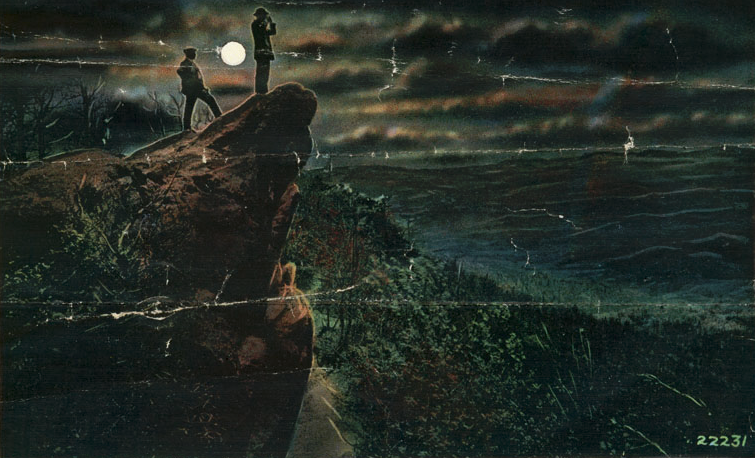In the wake of the Dec. 7, 1941, attack on Pearl Harbor and America’s subsequent entry into World War II, Asheville leaders prepared citizens for the threat of additional foreign strikes on American soil.
“Fire sirens will be sounded and factory whistles blown for three minutes Monday evening as a test of the air raid warning and black-out signaling system set up [here],” The Asheville Citizen reported on March 5, 1942. “It will be purely a test of the signaling devices — not a black-out, officials emphasized yesterday.”
The signals were inadequate. By and large, residents reported the sirens were inaudible from inside their homes and “hardly audible outside,” according to the paper’s March 10 edition. The city’s medical mobilization efforts, however, were successful with the majority of physicians, nurses, ambulance drivers and volunteers arriving at their assigned posts within 15 minutes of being called.
Later that month, the FBI organized a five-day war traffic school at the Langren Hotel in downtown Asheville (which previously stood where the AC Hotel stands today). On March 22, 1942, a detailed list of course offerings was featured in the Sunday edition of the Asheville Citizen-Times. Among the many scenarios addressed, participants would learn how to navigate and respond to “bomb damage to streets during air raids”; how to handle crowds at evacuation points; and how to operate vehicles “without full traffic light control during black-outs.”
By early summer, Asheville City Council approved emergency ordinances “clothing the city manager with sweeping powers” in the wake of an attack, wrote The Asheville Citizen on June 12, 1942. Meanwhile, the paper warned residents that penalties for looting amid an emergency blackout included a $1,000 fine (roughly $16,000 in today’s currency) and/or 12 months in prison.
On July 15, city officials awarded a contract to the Graybar Electric Co. for 18 Type D federal air raid warning sirens at a cost of $33.77 per signal (roughly $540 in today’s currency) to replace the weaker devices that failed to alert residents earlier in the spring.
The following month, at 10 p.m. Aug. 10, the mountains went dark for 30 minutes. “The Western North Carolina blackout test last night was almost 100 per cent effective,” The Asheville Citizen wrote in the following day’s paper. “Excessive cigarette lighting by persons in the downtown area was reported from one town,” the paper noted. “Carelessness by autoists was reported from another.”
In Asheville, the article continued, a few additional issues arose. A lighted window on the top floor of the New Medical building on the corner of North Market and East Walnut streets “offered a perfect target, until an air raid warden got busy,” the paper explained.
Meanwhile, on Battery Park Avenue “all lights blazed in one shop,” the article read. “A large crowd gathered and many of those present expressed indignation and wanted to break out a door window to gain entrance. City police informed members of the crowd that nothing was to be broken during a test.”
In another instance, the paper continued, air raid wardens were “forced to climb through a transom in the north end of the Arcade building to turn out bright lights which had been left on in an office.”
The newspaper concluded its account of the evening’s blackout with a gruesome anecdote:
“A group of boys and girls tied a dead mouse to the doorknob of the Battery Park avenue store which did not observe the black-out. One of the boys borrowed a lipstick from a girl and scribbled this on the glass door. ‘You had better black out next time.’”
At least three additional test runs were performed in Western North Carolina between 1942 and 1943. According to local publications, results improved during each subsequent blackout thanks largely to greater community buy-in and less cigarette smoking amid these emergency rehearsals.
Editor’s note: Peculiarities of spelling and punctuation are preserved from the original text, including the inconsistent handling of the word “blackout.”




Mr. Calder, your article gives me a better idea of when the WWII Black-Out operations began.
Around 2008, I was beginning to write my memoir, Lige of the Black Walnut Tree:… , and I was proudly recalling the nights we clearly heard the Black-Out and All-clear sirens a country mile away during WWII. Papa would faithfully go through the Mount Allen neighborhood to see whether anyone had forgotten to turn off a light. At the first sound of tbe siren’swhine, we sat in darkness and waited for Papa’s return. . Papa always carried his flashlight out of habit and would have used it only if the blackout had ended as he was returning home. Rural Black Mountain folk could find their way through the darkest of nights anyway. Remembering back to age eleven, I cannot recall ever hearing Papa say a neighbor had refused to obey the Lights-Out law.